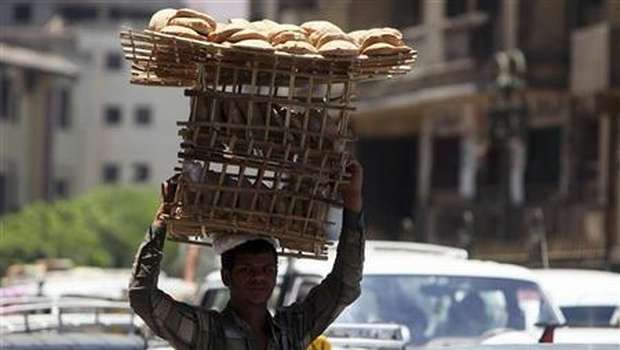
A man carries bread on wooden racks to be sold to customers in Cairo July 2, 2012.
(Reuters/Amr Abdallah Dalsh)
Egypt is the world’s biggest wheat importer, normally buying some 10 million tonnes a year and while the suspected corruption is focused on rice, the moves come just days after two senior officials from the General Authority for Supply Commodities (GASC) were transferred from their posts.
Traders fear any disarray within GASC could hurt its ability to launch international tenders. GASC has said the re-shuffles would not impact its import activity.
It has also unnerved companies involved in importing grain to Egypt and potentially a small group of global traders that supply them.
“It’s chaos, even the people inside GASC don’t know what’s going on and are concerned,” said an international grain trader.
On Saturday, Supplies Minister Mohamed Abu Shadi had referred the head of the central import administration at GASC to administrative prosecutors for suspected corrupt dealings with traders.
“The case has no relation at all with wheat, it is about dealings to purchase local rice from local traders in which the official had extended traders’ deadlines to 10 days instead of a week,” ministry spokesman Mahmoud Diab told Reuters but declined to name the man.
While GASC were not immediately available for comment, rice industry insiders were skeptical about the supply ministry’s assessment.
Egypt suspended rice exports in November to meet its domestic needs for a government subsidy program. The country had an exportable surplus estimated at 800,000 tonnes of rice last year.
Local consumption amounts to around 4 million tonnes of white rice a year, of which around 1.1 million tonnes are used for its subsidized rice program.
“It seems odd as there is an abundance of rice available for the local market since Egypt shut the door for exports,” a senior rice industry source said, referring to Diab’s comments.
Abu Shadi also sacked the head of the silos and storage holding company and other officials for failing to reach targets set for 2012/13. Diab said it was within the minister’s rights to inject new blood into the company.
Two senior GASC officials, dealing with wheat imports and procuring local rice, were moved from their posts a few days ago. Diab said they were still working within GASC.
The changes mark another flashpoint in Egypt’s food supply after deposed Egyptian President Mohamed Mursi spent his year in power dramatically reducing wheat imports in a failed attempt at self-sufficiency.
Abu Shadi has said self-sufficiency needs swift action towards increasing Egypt’s wheat storage capacity from 1.5 million tonnes to 6 million tonnes.
The Egyptian company for silos is responsible for building 50 new ones. The United Arab Emirates, one of the Gulf Arab states that showered Egypt with billions of dollars after Mursi’s fall, is funding 25 other silos.
